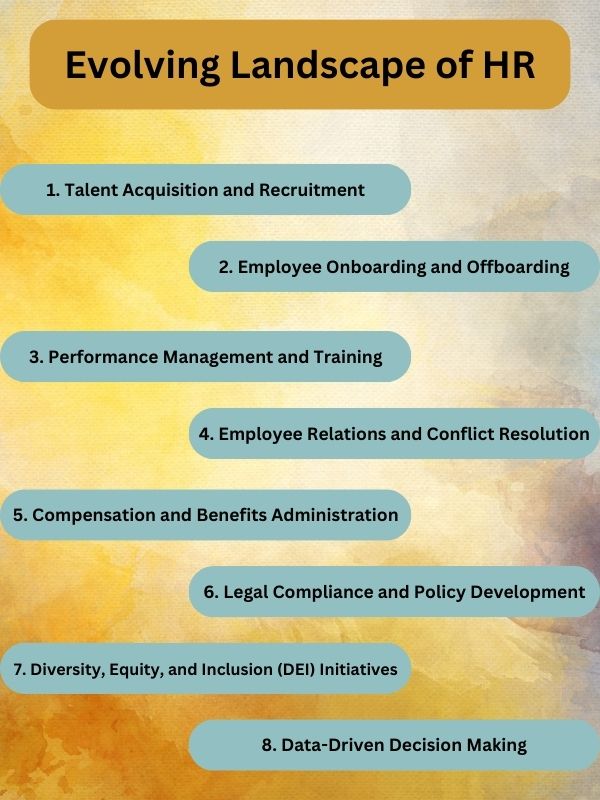
Human Resources (HR) is a vital department within any organisation, serving as the bridge between the company and its employees. As businesses evolve and workplaces adapt to changing dynamics, the role of HR has expanded to encompass a wide range of responsibilities. In this article, we will delve into the key roles and responsibilities of HR professionals, along with the essential skills required to excel in this field.
The Evolving Landscape of HR
Gone are the days when HR was solely responsible for administrative tasks such as payroll processing and employee record-keeping. Today, HR plays a strategic and integral role in shaping an organisations success by managing its most valuable asset: its people. Let us explore HR professionals primary roles and responsibilities in todays dynamic business environment.
1. Talent Acquisition and Recruitment
Attracting and retaining top talent is a core function of HR. HR professionals collaborate with hiring managers to identify staffing needs, create job descriptions, and develop recruitment strategies. They also manage the entire recruitment process, from sourcing candidates and conducting interviews to making job offers. In addition to technical skills related to recruitment platforms, HR specialists need strong interpersonal skills to effectively assess candidates cultural fit and potential.
2. Employee Onboarding and Offboarding
A seamless onboarding process is crucial for new employees to integrate into the company culture and perform effectively. HR facilitates orientation programs, introduces company policies, and ensures that new hires have the resources they need to succeed. Conversely, when employees leave the organisation, HR manages the offboarding process, including exit interviews and documentation.
Read Also:
5 Tips for Successful Online Job Interviews
10 Common Interview Mistakes and How To Avoid Them
3. Performance Management and Training
HR professionals collaborate with managers to set performance expectations, conduct regular performance evaluations, and provide feedback. They identify training needs and develop programs to enhance employees skills and knowledge, thereby contributing to individual growth and organisational success.

4. Employee Relations and Conflict Resolution
Maintaining positive employee relations is a critical responsibility of HR. HR professionals act as mediators to resolve conflicts and address grievances in a fair and unbiased manner. They strive to create a harmonious work environment where employees feel heard and valued.
Apply for Human Resource Jobs Click Here
5. Compensation and Benefits Administration
HR manages compensation and benefits programs to ensure they are competitive and aligned with industry standards. This includes salary structuring, bonus distribution, and overseeing employee benefits such as health insurance, retirement plans, and wellness initiatives.
6. Legal Compliance and Policy Development
Staying informed about labor laws and regulations is imperative for HR professionals. They ensure that the organisation adheres to legal requirements and ethical standards in all employment practices. HR also plays a role in developing and communicating company policies that promote a safe, inclusive, and respectful workplace.
7. Diversity, Equity, and Inclusion (DEI) Initiatives
In todays diverse workforce, HR is instrumental in driving initiatives that promote diversity, equity, and inclusion. HR professionals work to create an environment where employees from all backgrounds feel valued and have equal opportunities for growth.
8. Data-Driven Decision Making
With the advent of technology, HR has embraced data analytics to make informed decisions. HR professionals analyze employee data to identify trends, predict turnover, and develop strategies for workforce planning and optimization.
Essential Skills for HR Professionals
To effectively fulfill these roles and responsibilities, HR professionals require a diverse set of skills. Lets highlight some of the essential skills that can set HR practitioners apart in their careers.
1. Communication Skills
Effective communication is at the heart of every HR task. HR professionals need to communicate clearly and empathetically, whether they are conducting interviews, providing feedback, or addressing conflicts.
2. Emotional Intelligence
Understanding and managing emotions, both ones own and those of others is crucial for building strong relationships and resolving conflicts in the workplace.
3. Problem-Solving Abilities
HR professionals often encounter complex and sensitive situations that require creative problem-solving and critical thinking skills.
4. Organisational Skills
Managing multiple tasks, from recruitment to benefits administration, requires strong organisational skills to ensure nothing falls through the cracks.
5. Adaptability
The HR landscape is constantly evolving, so professionals must be adaptable and open to learning about new laws, technologies, and best practices.
6. Ethical Judgement
HR deals with confidential and sensitive information. Practitioners must exhibit a high level of ethical judgement and maintain strict confidentiality.
7. Negotiation Skills
Negotiating employment terms, resolving conflicts, and collaborating with vendors all require effective negotiation skills.
8. Analytical Thinking
Data-driven decision-making is a growing trend in HR. Being able to analyze data and draw meaningful insights is a valuable skill.
9. Leadership and Influence
HR professionals often guide and influence managers and employees, so leadership skills are essential for driving change and fostering a positive workplace culture.
10. Technical Proficiency
HR technology is advancing rapidly. Proficiency with HR software, applicant tracking systems, and data analytics tools is becoming increasingly important.
Conclusion
The roles and responsibilities of HR professionals have evolved significantly over the years, transcending traditional administrative tasks to encompass strategic functions that contribute to organisational success. From talent acquisition to employee development, HR plays a pivotal role in shaping a positive workplace culture and ensuring the well-being of employees. To excel in this dynamic field, HR professionals must possess a combination of interpersonal, analytical, and technical skills. As businesses continue to adapt to changing dynamics, the importance of HR in fostering a thriving workforce cannot be overstated.



